Real Estate Agent Commissions: What You Need to Know With GAP Real Estate.
Ever thought about saving money on your next property deal by learning about real estate agent commissions in Costa Rica?
Real estate can be tough, especially when dealing with commission fees. This article aims to clear up the confusion around real estate agent commissions. It focuses on GAP Real Estate, with over 20 years in Costa Rica. It will cover how commission rates work, how to negotiate, and GAP Real Estate’s unique commission model.
Key Takeaways
- Real estate agent commissions in the U.S. typically range from 1% to 6%, with 4% to 6% being the most common.
- Understanding the commission structure is essential for making informed property transactions in Costa Rica.
- Commissions are negotiable and can differ based on market conditions and property values.
- The recent NAR settlement aims to increase transparency around agent fees, impacting future negotiations.
- GAP Real Estate offers a unique commission model that can lead to cost savings for clients.
Understanding Real Estate Agent Commissions
Real estate agent commissions are a big part of the cost when buying or selling a property. These fees usually take 5% to 6% of the sale price. The seller usually pays this fee, which is split between the seller’s and buyer’s agents.

The commission is divided among the listing agent, their broker, the buyer’s agent, and the buyer’s broker. A typical split is 60% to the agent and 40% to the broker. But, some splits can be 50/50 or 70/30. In 2023, the average commission rate was 5.37%, with 2.72% going to the seller’s agent and 2.65% to the buyer’s agent.
These commissions add to the costs of real estate agents in a deal. Knowing how commissions work is key to negotiating and understanding the seller’s costs. For instance, a $400,000 home sale could mean a $24,000 commission at 6%. A $200,000 sale would be $12,000. This shows why understanding real estate fees is crucial.
Agents also have extra costs like broker fees, MLS fees, and admin costs. These can take about 30% off their commission. So, agent commission rates affect how agents make money and the whole buying and selling process.
The Standard Commission Structure in Costa Rica
Knowing how commissions work is key for those looking into real estate in Costa Rica. Agents usually charge between 5% and 10% of the sale price, plus a 13% Value Added Tax (VAT). This makes it clear how real estate deals are handled.
Typical Commission Rates
In the Central Valley, agents charge 5% plus 13% VAT for all properties. But, outside this area, rates can change a lot depending on the property type:
- House and condo: 6-8% + 13% VAT
- Luxury home: 6-8% + 13% VAT
- Building lot: 6-10% + 13% VAT
- Farm: 10% + 13% VAT
- Commercial property: 6-10% + 13% VAT
- Business: 10% + 13% VAT
- Properties valued at less than $50,000: 10% + 13% VAT
The commission in Costa Rica shows how much agents earn from a sale. Sellers usually pay this fee, making one wonder: who pays the commission most of the time?
Who Pays the Commission?
Sellers usually pay the commission costs. Unless they agree to share it with the buyer. This can lead to agents working for both sides, splitting the commission. Exclusive listings might offer higher rates to agents for bringing in buyers.
Sellers should know the average commission rates in their area. This helps them make smart choices when selling.
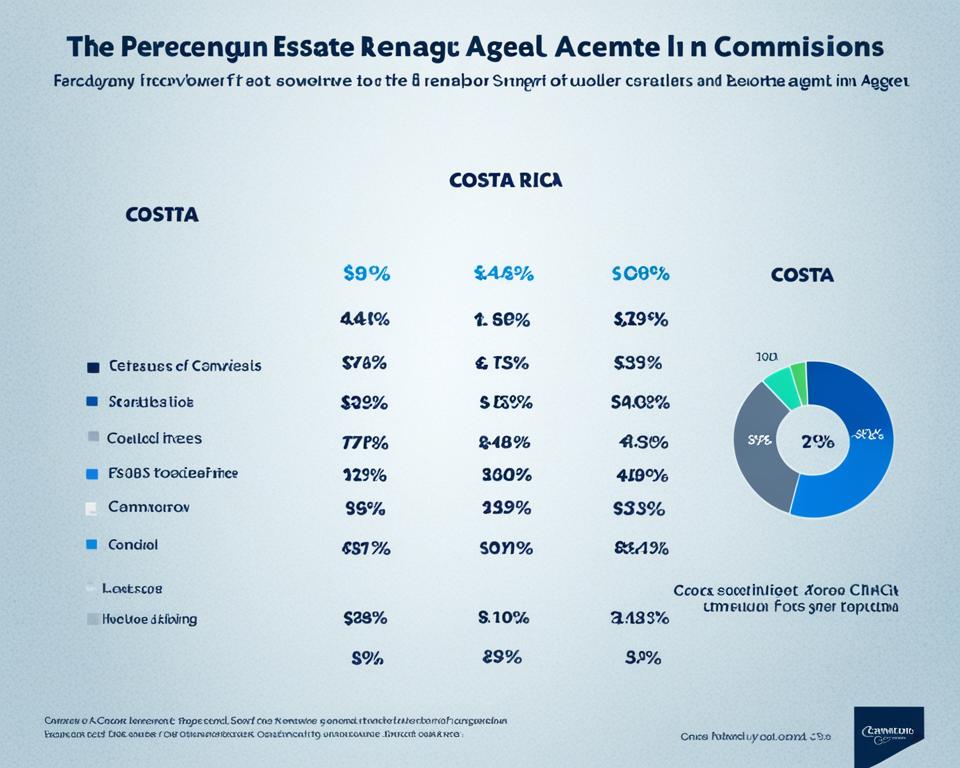
What Factors Influence Agent Commission Rates?
Understanding real estate agent commissions involves several elements. These elements affect the rates agents charge in Costa Rica. Market conditions and property value play big roles in setting commission rates. This leads to different charges for various transactions.
Market Conditions
The current market state is key in setting commission rates. In a buyer’s market, with more homes for sale, agents might offer lower commissions to make sales. On the other hand, in a seller’s market, with more buyers, agents might charge more, showing the competitive nature of selling homes.
New trends like discount brokers and online listings have changed traditional commission structures. These changes affect how agents and sellers negotiate commissions.
Property Value
Property value is crucial in determining commission specifics. For high-priced properties, commissions might be lower or structured differently to help in negotiations. As property values change, so do commission rates, aiming for a successful sale.
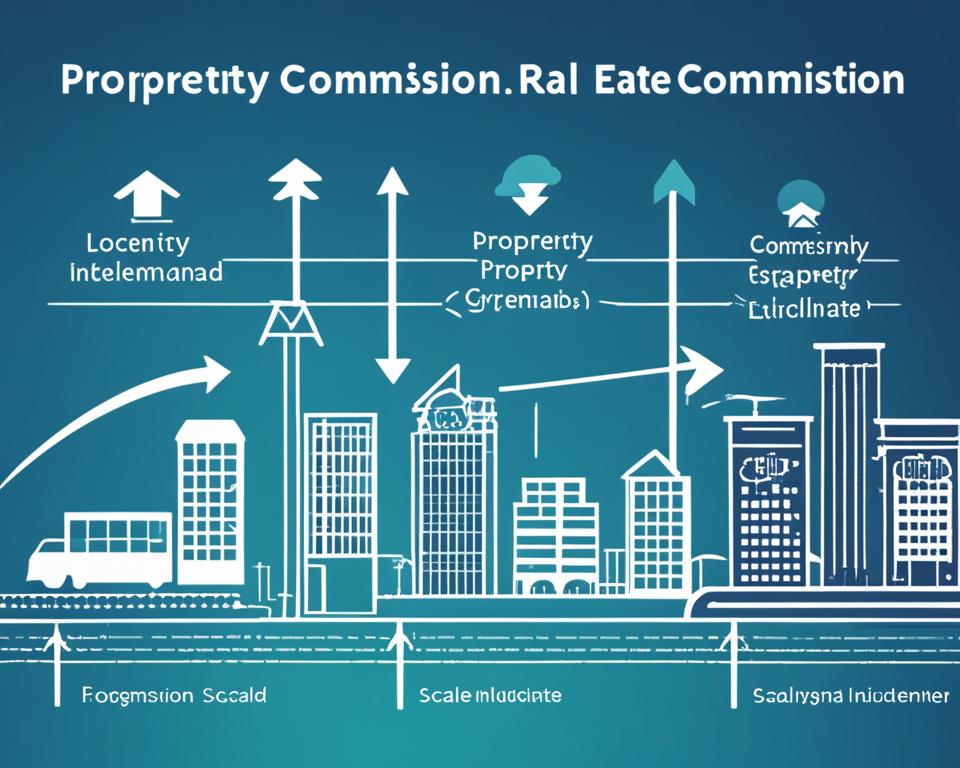
How to Negotiate Real Estate Agent Commissions
Learning how to negotiate real estate agent commissions can save a lot of money for buyers and sellers. With the right strategies, you can get the best commission rates that fit your budget. It’s important to know that commission fees can be negotiated, so being confident and informed is key.
Strategies for Buyers
Buyers can use several strategies to negotiate commission fees. First, it’s important to research what commission rates are usually like in your area. This information helps you start a good conversation. You might suggest paying less or offer a bonus if the agent finds the perfect property for you. Talking openly about what you expect can really help in negotiating commission fees.
- Research standard commission rates in the local market.
- Discuss potential flexibility in agent fees.
- Consider bonuses for exceptional performance by the agent.
Strategies for Sellers
Sellers can also use smart negotiation tactics. If you have a competitive listing or a property in a great location, you might get lower commission rates. Talking about reducing fees and how a quick sale benefits everyone can lead to a good deal. Using resources like GAP Real Estate can help you find commission models that work for you. Aim for realistic terms since commission fees can be adjusted based on your sale.
- Leverage property positioning for a quicker sale.
- Discuss potential reductions based on competitive listings.
- Use negotiation tools and tools from real estate professionals.
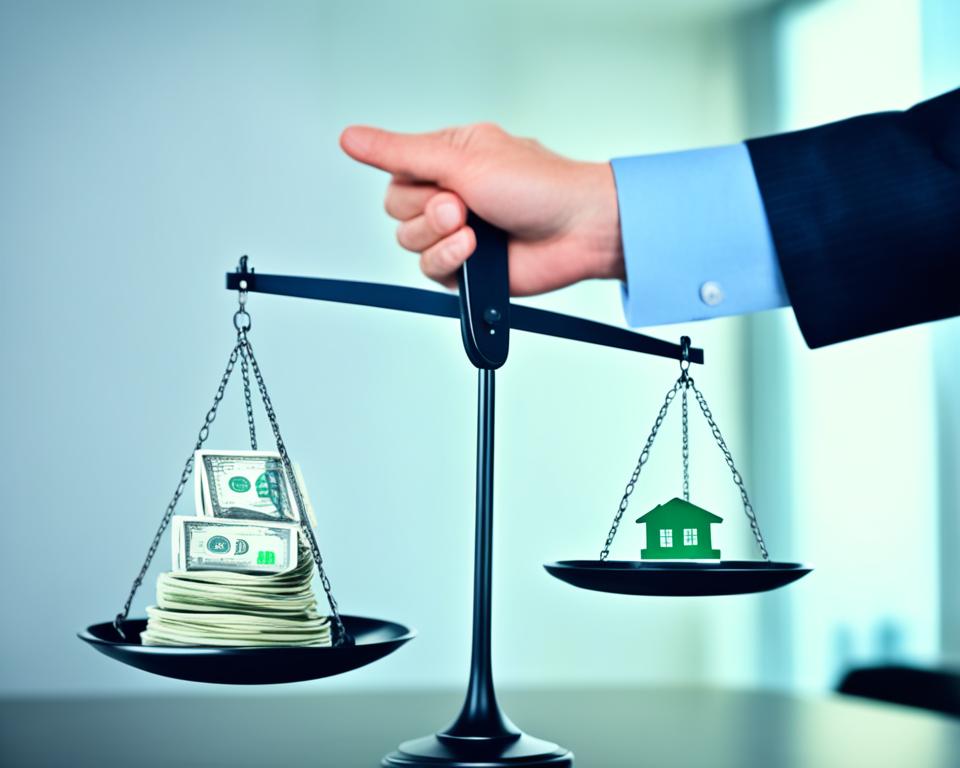
By using these strategies, buyers and sellers can make real estate deals better. Understanding that commission negotiation is common helps you be ready to talk about it during the buying or selling process.
GAP Real Estate’s Unique Commission Model
GAP Real Estate has created a new way to pay commissions that helps sellers save money in Costa Rica’s property market. They use an open listing method. This lets sellers market their properties without paying upfront fees.
Open Listing Benefits
The open listing benefits from GAP Real Estate include:
- Sellers don’t pay any fees upfront, saving them money right away.
- They only pay a 6% commission after the sale, which is cheaper than the usual 10%.
- This way, sellers can work with several agents to find the right buyer.
- GAP Real Estate uses strong marketing to make properties more visible to buyers.
Commission Calculation Example
It’s important for sellers to know how the commission works. For example, if a house sells for $300,000, the commission would be $18,000. This is 6% of the sale price, as set by GAP Real Estate.
GAP Real Estate has over 20 years of experience in Costa Rican real estate. They use tools like Comparative Market Analysis (CMA) for precise property values. For more details on their commission model, visit this page. They focus on personal service and clear communication during the selling process.
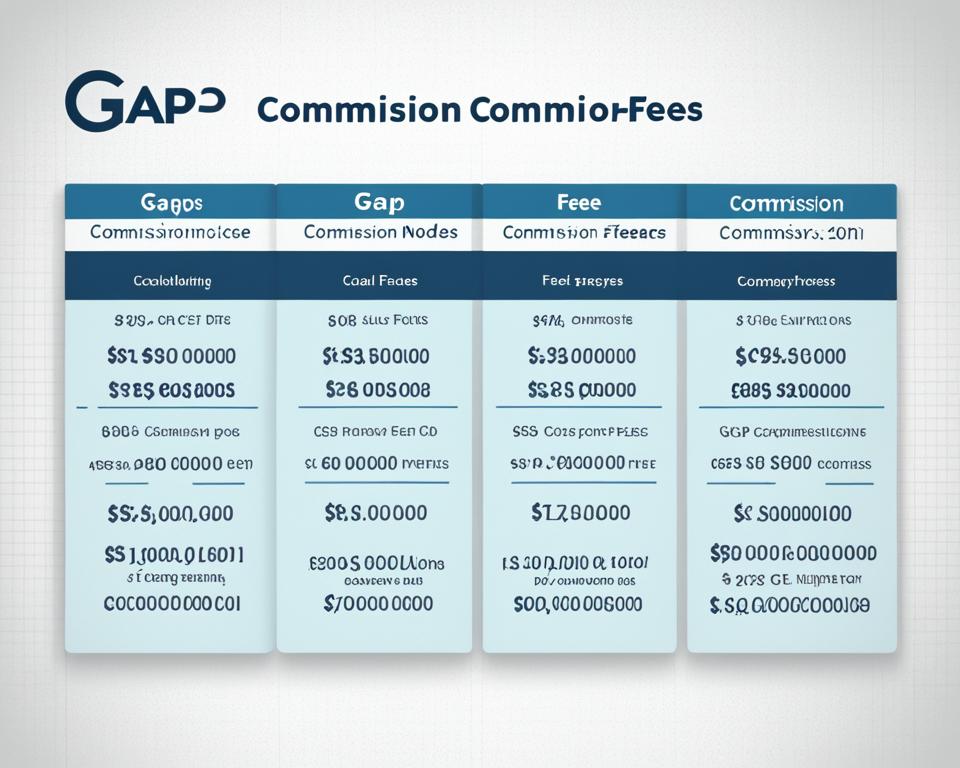
Understanding Real Estate Fees Beyond Commission
When you sell a home, you’ll find costs go beyond agent commissions. You’ll see various closing costs and other expenses that affect your finances.
Closing Costs
Closing costs usually are 5% to 8% of the home’s sale price. These fees help finish the sale and include things like:
- Title transfer fees
- Attorney fees
- Appraisal costs
- Loan underwriting and origination fees
- Insurance premiums
- Taxes and title filing fees
Sellers should think about how these costs add up to their total expenses when selling.
Additional Seller Expenses
There are more costs sellers might face to get their property ready for sale. Things like staging or renovations can make the home more valuable but cut into profits. Sellers should plan for these costs early, as improving the property can pay off. For sellers wanting to avoid upfront fees, GAP Real Estate offers ways to boost property value without initial costs.
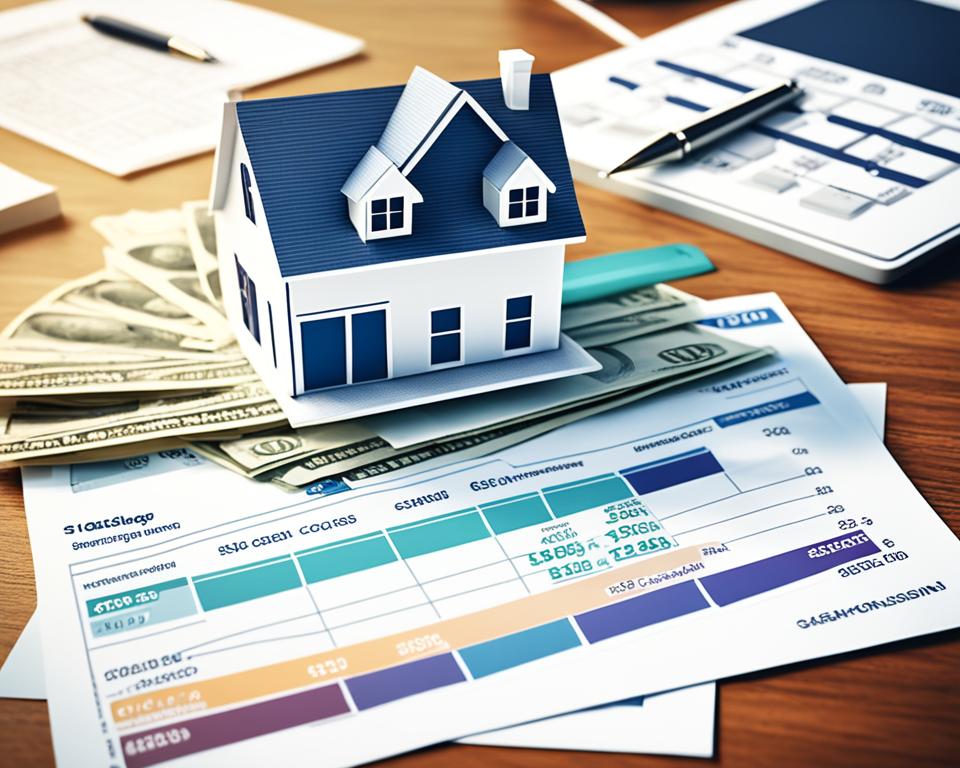
Knowing all the costs, like closing and additional expenses, is key for good budgeting and planning. This knowledge helps sellers feel more confident and clear about their real estate deals.
Comparing Costs: GAP Real Estate vs. Traditional Agents
Looking at real estate costs, GAP Real Estate and traditional agents show big differences. Traditional agents charge a 10% commission on sold properties. This can really cut into a seller’s profits. GAP Real Estate, on the other hand, offers a 6% commission only if the sale is successful. This makes them a great choice for those wanting to save money.
This lower commission means sellers can spend more on improving their property and marketing. GAP Real Estate uses their deep local knowledge to create marketing plans that fit each property’s needs. This approach helps sell properties faster and for better prices, showing why choosing GAP Real Estate is smart.
GAP Real Estate also offers open listing agreements without upfront fees. This gives sellers more control over the sale. For more details on these services, check their website.
Choosing GAP Real Estate can save sellers thousands in commission. While traditional agents offer standard services, GAP focuses on personalized and efficient help. This approach builds strong client relationships and leads to successful sales. Their growing number of happy customers shows the benefits of picking GAP Real Estate over traditional agents.
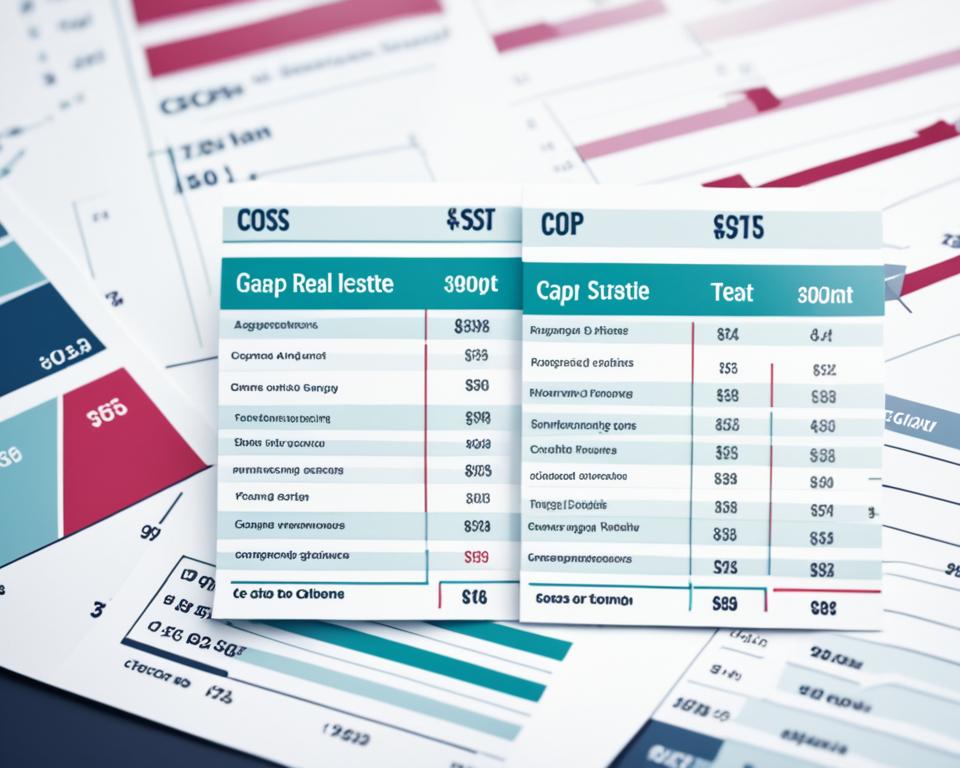
Conclusion
Knowing about real estate agent commissions is key for buyers and sellers in Costa Rica. Traditional rates are usually 4% to 5%. But, with agencies like GAP Real Estate, you might get better deals. They offer flexible rates that can save money for both new and experienced buyers.
Changes in rules might make real estate commissions go down. This could mean buyers might pay their agent’s commission directly. This change could affect how much things cost and how agents compete with each other in the future.
Working with experts like GAP Real Estate helps clients make smart choices. They know the market well and focus on serving their clients. This makes them a great choice for dealing with real estate commissions in Costa Rica.
FAQ
What is the typical commission percentage for real estate agents in Costa Rica?
Who is responsible for paying the real estate agent commission?
Can I negotiate real estate agent commissions?
What factors influence the commission rates charged by real estate agents?
How does GAP Real Estate’s commission model differ from traditional agencies?
What additional real estate fees should I expect beyond agent commissions?
How is the commission calculated in a real estate transaction?
Source Links
- https://erika.com/realtor-commission-changes/
- https://www.carealtytraining.com/blogs/real-estate-agent-commission
- https://www.investopedia.com/articles/personal-finance/080714/how-do-real-estate-agents-get-paid.asp
- https://www.paperlesspipeline.com/blog/real-estate-commissions-explained
- https://www.nerdwallet.com/article/mortgages/real-estate-agent-commission
- https://livingcostarica.com/costa-rica-real-estate-topics/what-is-the-going-real-estate-commission-rate-in-costa-rica/
- https://www.costarica.com/real-estate/faq.html
- https://origin.larepublica.net/noticia/a-practical-guide-for-property-buyers-in-costa-rica
- https://www.bankrate.com/real-estate/realtor-fees/
- https://www.realestate.com.au/advice/real-estate-agent-commissions/
- https://www.cbsnews.com/news/fees-real-estate-agent-how-to-negotiate/
- https://www.bankrate.com/real-estate/negotiate-real-estate-commission/
- https://www.cnbc.com/2024/02/29/how-to-negotiate-real-estate-agent-commissions.html
- https://www.gaprealestate.com/open-listing-property-sales-in-costa-rica/
- https://www.gaprealestate.com/santa-ana-costa-rica-commission-free-home-sales/
- https://www.investopedia.com/articles/active-trading/031215/how-real-estate-agent-and-broker-fees-work.asp
- https://realestatelicensewizard.com/why-do-real-estate-agents-get-a-percentage/
- https://www.realtor.com/advice/sell/real-estate-commission-explained/
- https://www.felixhomes.com/blog/how-much-commission-does-a-realtor-make
- https://www.linkedin.com/pulse/how-cutting-commissions-can-hurt-your-chances-selling-sean-sassoon
- https://www.bankrate.com/real-estate/real-estate-commissions-lawsuit-impact/
- https://www.investopedia.com/financial-edge/0611/understanding-real-estate-commissions-who-pays.aspx
- https://www.washingtonpost.com/home/2023/11/02/real-estate-commissions-explained/




